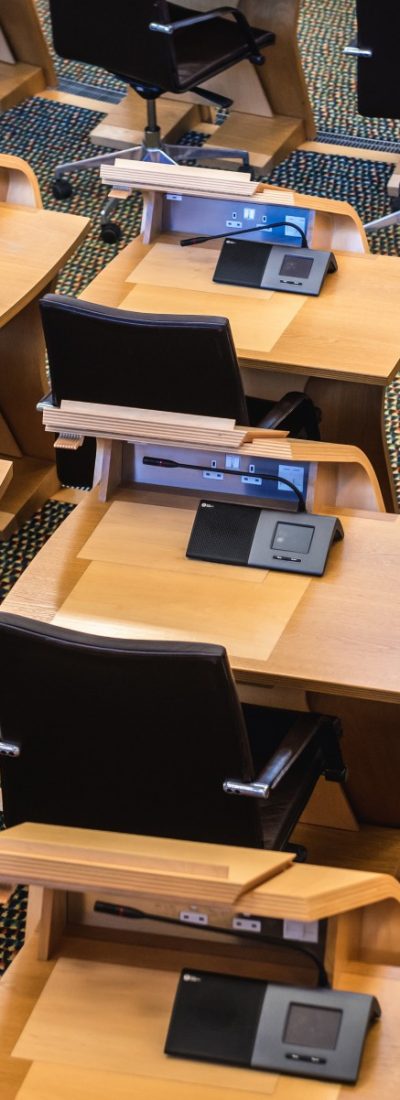Step 1
Next steps to plan your engagement...
1. What is a policy question?
2. How do you find a policy question related to your research?
1. How does the policy system work in Scotland?
2. How do you find the right person to talk to?
1. How do timings work in the policy world?
2. How do you identify the right timing?
Why engage with policy professionals?
There are many reasons to engage with policymakers but perhaps the most obvious is simply to make the world a better place. There are plenty of ways of doing this, these might include giving expert advice to a government official, submitting evidence to a parliamentary inquiry, working with opposition politicians or campaigners to highlight a neglected topic, or joining an expert working group advising a public agency.
There are lots of reasons why it is worth investing time in policy engagement but they can be broadly clustered together by thinking in terms of motivations, outcomes and methods.
There are lots of questions you might have at the outset of this journey but some very common ones can be thought of in three clusters:
- Who else is in this journey?
1
Who benefits from my engagement?
Benefits for scholars
Policy engagement is not all about REF and impact but, of course, those are important. For many disciplines, notably in the social sciences, working with policy professionals can provide a valuable route to impact for their research. However, even for these disciplines, there are other benefits that would include:
- Subjects for research
Policymakers have questions that need answers and the data needed to answer them.
- Intellectual rigour
There can be fewer places to hide in a two-page briefing for a specialist but non-academic audience than in a 9000 word article for other scholars, which can provide a useful intellectual discipline.
- Interesting work
Policy development is interesting and challenging (and really, really complicated). Academics can have privileged access to this world because of the insights their scholarship offers.
- A virtuous circle
Interacting with policy provides a refining process for research conclusions and allows opportunities to gain insights from practitioners, which in turn raises further topics for research.

Interacting with policy provides a refining process for research conclusions and allows opportunities to gain insights from practitioners

Policy officials are also working to much tighter deadlines than is usually the case for academics.
Benefits for policy professionals
Academic research covers a bewildering array of questions, many of which may have policy implications but the research is rarely intended explicitly for a policy audience. Much of the work of policy engagement involves efforts to square that circle. But why are policy professionals in government and elsewhere interested in what academics have to say?
- More researchers than policy professionals
There are simply far, far more researchers in universities than in governments, parliaments and other policy institutions. As a result, their work is often far more fine-grained. A researcher working in policy might have a brief covering ‘the environment’, ‘trade’ or ‘health’, possibly as part of a small team. They will be called upon at short notice to dive into a topic that an academic may have been investigating for years.
- Different pressures and a different pace
Academics are mostly detached from the everyday pressures of politics, which allows them a perspective rarely granted to those working within policy. This can reframe old questions in new ways, provide perspectives from fresh vantage points and breakthrough entrenched positions. Often scholars can bring comparative or historical perspectives and offer new insights by using fresh methodologies or approaches from an unexpected disciplinary viewpoint.
- Depth and breadth of understanding
Scholars often devote decades to a particular question or set of questions, meaning they can build up an extraordinary depth of understanding. Approached in the right way, this offers policymakers valuable and original insights.
- Longer deadlines
Policy officials are also working to much tighter deadlines than is usually the case for academics. This is both a blessing and a curse for policy engagement – university research can have a richness and range not often available through other means but delivering it to a timescale that works for policymakers can be a challenge.
Benefits for the society
There are many good reasons to think that research-informed policy is simply better policy. Policymaking is an extraordinarily complex process and research can help minimise unintended consequences. Academics can provide new ways of thinking about problems, international and historical context, as well as access to extensive data and rigorous analytical tools.
- Learning from the past
Historical and comparative experience can inform policy discussion, highlighting past errors and identifying solutions that have worked in similar situations. Doing so not only saves time and money but can help ensure that citizens are not subjected to poorly-constructed policy solutions.
- New tools
Scholarly analysis can be a valuable tool in assessing whether particular policy solutions achieved their intended aims. Doing so helps the public assess the records of administrations at all levels of government and increases policymakers’ accountability to the public.
- Fresh solutions
The application of evidence and rigorous intellectual tools can help refashion policy debates that may have been framed in the same way for many years – sometimes for many decades. Doing so can offer fresh solutions, and present new options to communities across Scotland.

The application of evidence and rigorous intellectual tools can help refashion policy debates that may have been framed in the same way for many years
2
What will be the impact of my engagement?
Obviously, it depends on the exact nature of your engagement but in all likelihood it will be fairly limited. Policy is shaped by a huge number of pressures and there are many voices demanding attention at any given time. This can mean in any one interaction, the effect of your work might be quite modest but the real opportunities for change come from building relationships and engaging with the policy community over the course of months, years or an entire career.
Who else is in this journey?
Academics, and the research they bring to the table, do not provide the same kind of evidence as others. It does not (usually) represent their personal or sectoral interest and is, of course, grounded in scholarship. This gives academic voices a privileged position in policy debate but it does not make it the only one. Policymakers will take account of evidence and analysis but must also think of the outcomes of any policy change.

Policy is shaped by a huge number of pressures and there are many voices demanding attention at any given time

Relationships matter
Individual policy encounters can often take place under the pressure of deadlines and may well be framed by political or budgetary constraints. This can mean that there are limited opportunities to affect change and that the opportunities for progress can be minimal. However, academics are well-placed to become the ‘go-to expert’ on a particular topic and can build a network of relationships across different policy institutions.
3
How much do I need to adapt to policy professionals?
It is very important to distinguish between adapting the substance of research (which might include findings, data and conclusions) and adapting the shape of its outputs or the means by which they are communicated. It will also often be the case that the most important finding in policy terms may not be the main academic highlight.
Don't change the substance of your research
At no point should you change the substance of a study or alter your expert opinion to serve the interests of a particular government or individual policymaker. As well as being the mainstay of academic freedom, this is also the very reason that academics are part of the policy discussion – because they are not swayed by the political winds. However, you may want to highlight those findings or the particular aspects of your analysis that have the best chance of securing change – and those might change with the political weather.


Producing different outputs from your research
Common research outputs such as journal articles, chapters or even books will probably not fit well into the processes of policy formulation. Good tools might include short briefings, research syntheses, blogs and infographics. Regardless of the precise communication tool, however, the critical considerations in order of importance are:
-
Relevance to the question at hand
-
Clarity of the language and concepts used
-
Brevity - get to the point as quickly as possible.
Pick the right tool for the job
There is no perfect communication tool – everything loses something in transmission. All communication tools are a compromise between what you want to say (message) and who you’re saying it too (audience). The more time you can give to thinking about who your audience is, how they usually acquire information, what they already know, what they need to know and so on, the more effective you will be in engaging with them. Similarly, think about what you need to say; does it address the policy challenges at hand, have you stripped away unnecessary content, are there underlying assumptions that need to be explained? Spending time (at least a day) thinking about your message and your audience will make picking the correct tool much easier.


Don't wait until your final results or conclusion
It can be useful to engage with you audience as early as possible. Policy works to its own timetables and they tend to be unforgiving. There’s usually no need to alter your research plan but it can be useful to stay in touch with those policy professionals you’re working with, so that they are aware of your direction of travel and they can let you know if deadlines have tightened or if the policymaker’s focus has shifted to another aspect of the topic.
